Brazil's Legal Battle with X: Free Speech and Compliance

The ongoing conflict between Brazil's Supreme Court and Elon Musk's social media platform, X (formerly Twitter), highlights the complex interplay between free speech, legal compliance, and governmental authority. This article explores the key aspects of this dispute, the legal implications, and the broader context of free speech in Brazil.
JUST IN: 🇧🇷 Brazil says anyone caught using a VPN to access X (Twitter) will be fined up to $8,874 per day.
— Watcher.Guru (@WatcherGuru) August 30, 2024
Background of the Conflict
The dispute began when Brazil's Supreme Court, led by Justice Alexandre de Moraes, ordered X to appoint a legal representative in the country. This requirement is part of Brazil's regulatory framework for foreign companies operating within its jurisdiction. X's failure to comply with this mandate led to a court order to block the platform in Brazil[1][2].
Justice Moraes has been involved in multiple investigations aimed at curbing misinformation and activities linked to former President Jair Bolsonaro's supporters. These efforts include suspending accounts accused of spreading false information, which Musk has criticized as censorship[6][8].
The oppressive regime in Brazil is so afraid of the people learning the truth that they will bankrupt anyone who tries https://t.co/VgYPRJMXJv
— Elon Musk (@elonmusk) August 30, 2024
The group of countries that Brazil is about to join in banning the use of VPN's to access prohibited sites: pic.twitter.com/8uADnIo5K1
— Glenn Greenwald (@ggreenwald) August 30, 2024
They’re shutting down the #1 source of truth in Brazil https://t.co/RasqcQ3ySM
— Elon Musk (@elonmusk) August 30, 2024
Justice Moraes, who has been involved in a long-running row with X, had given the social media platform 24 hours to name a new legal representative or face suspension, with a deadline of Thursday evening.
The platform is expected to be unavailable in the country within the next 24 hours.
Justice Moraes has given companies such as Apple and Google a five-day deadline to remove X from its application stores.
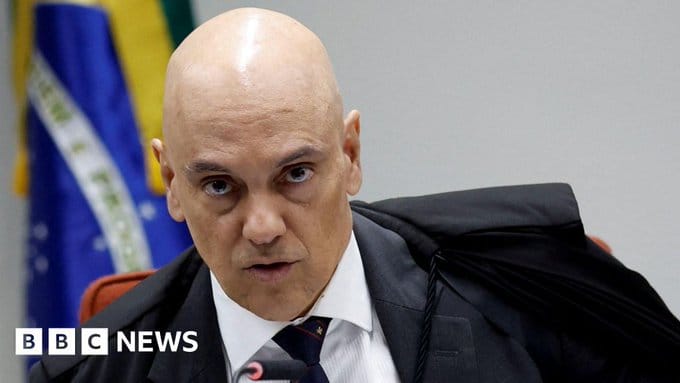
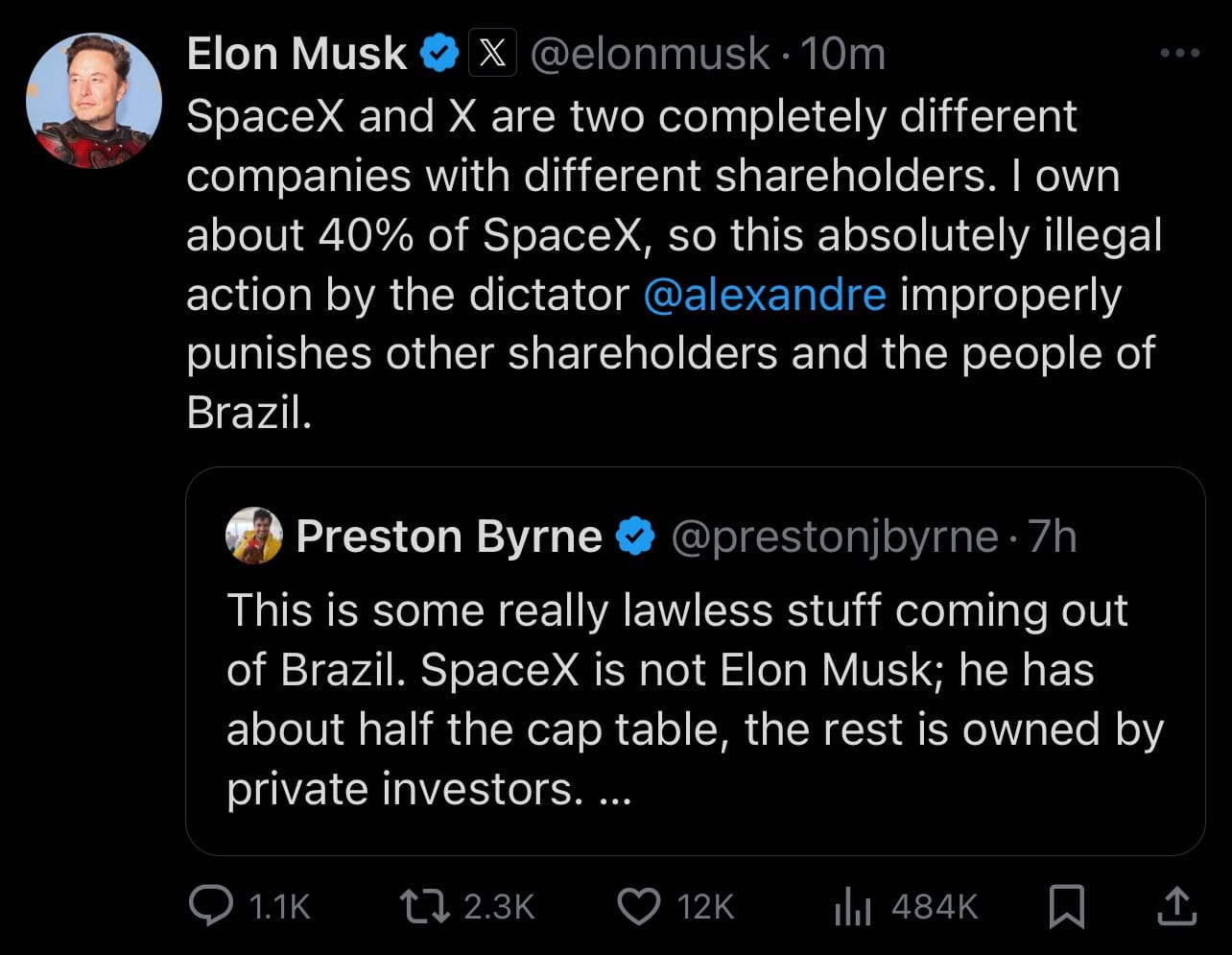
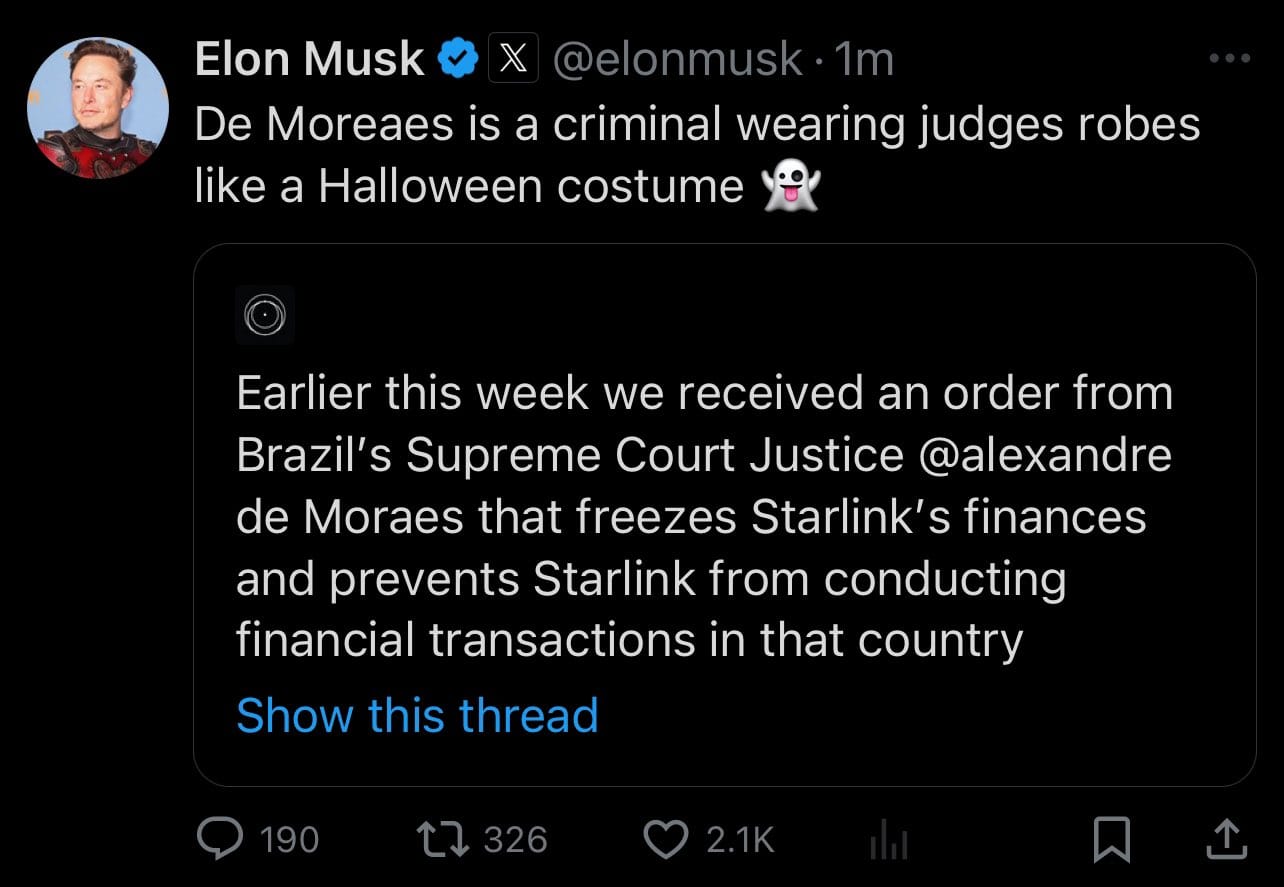
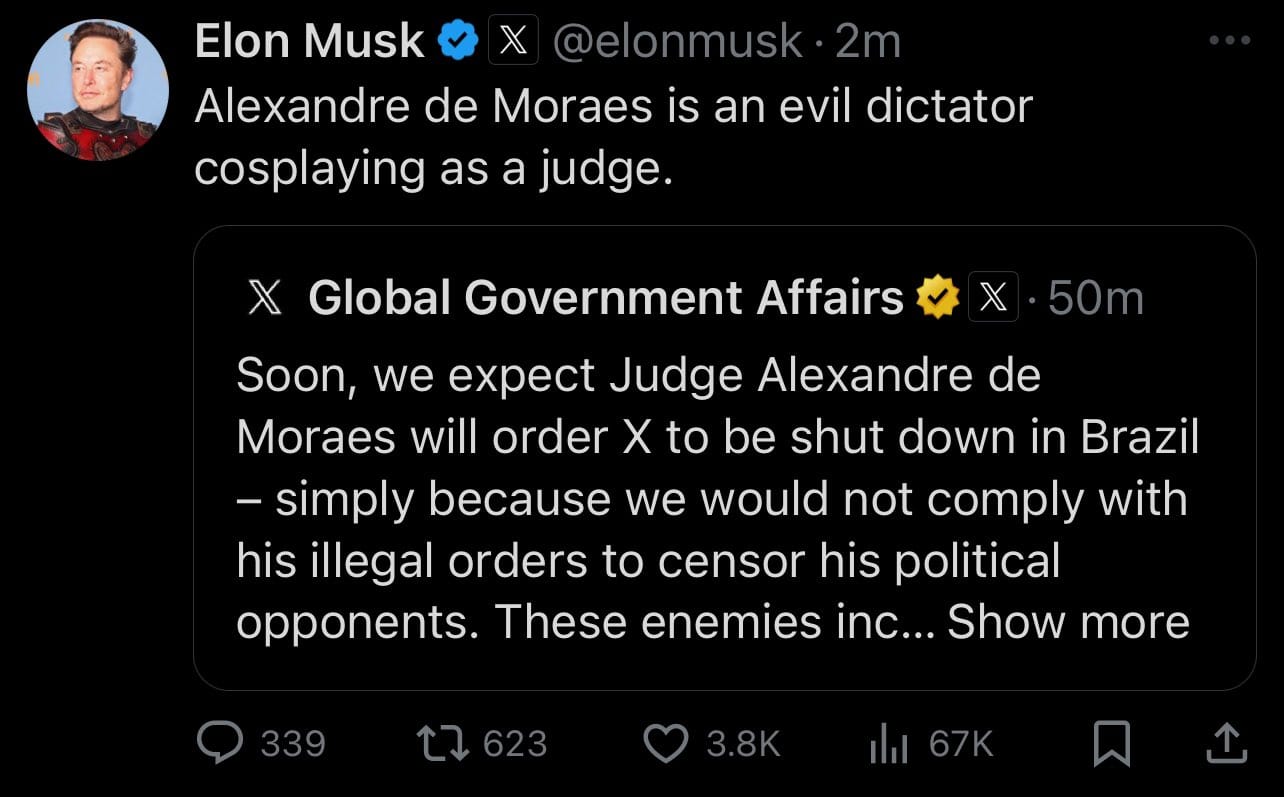
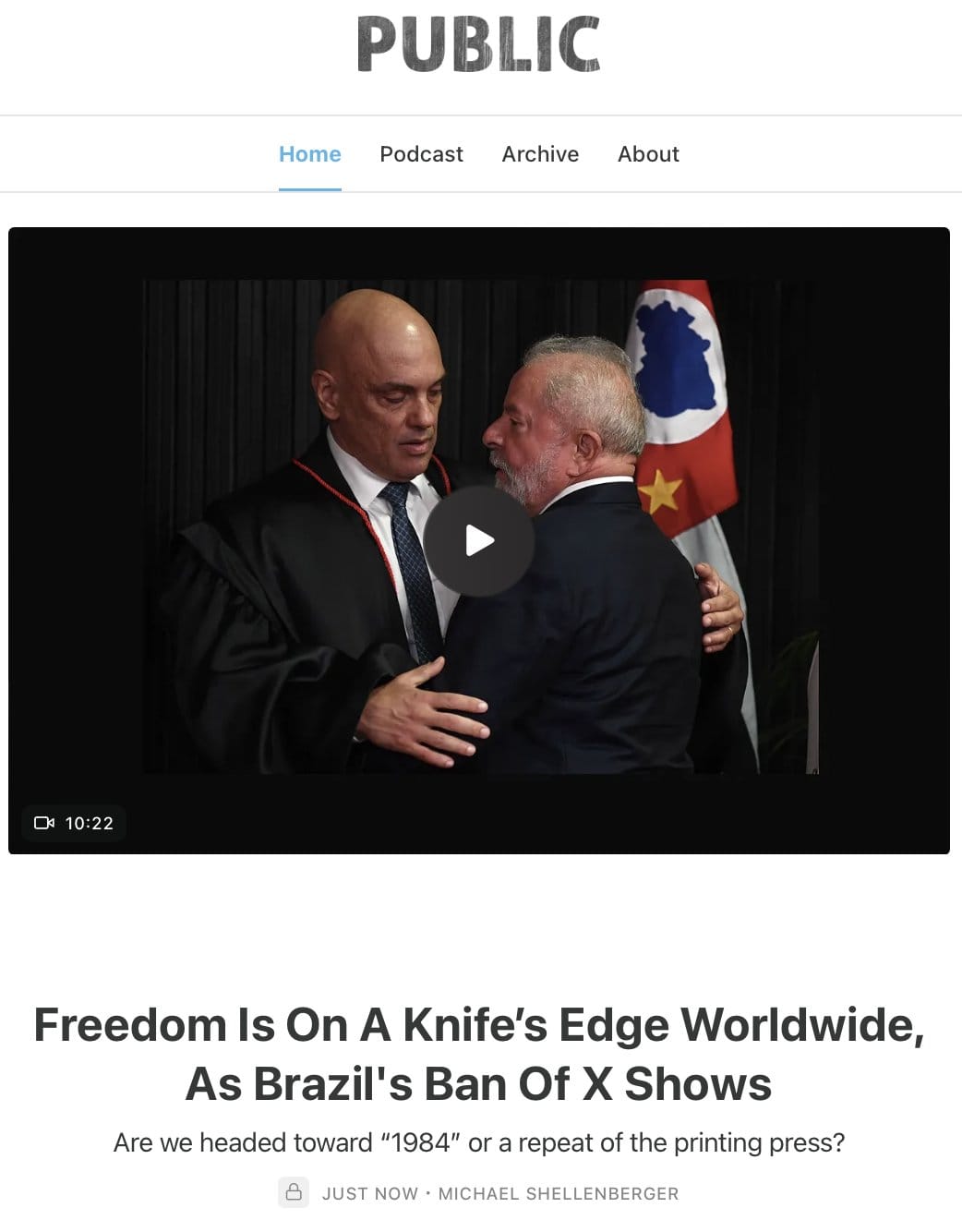
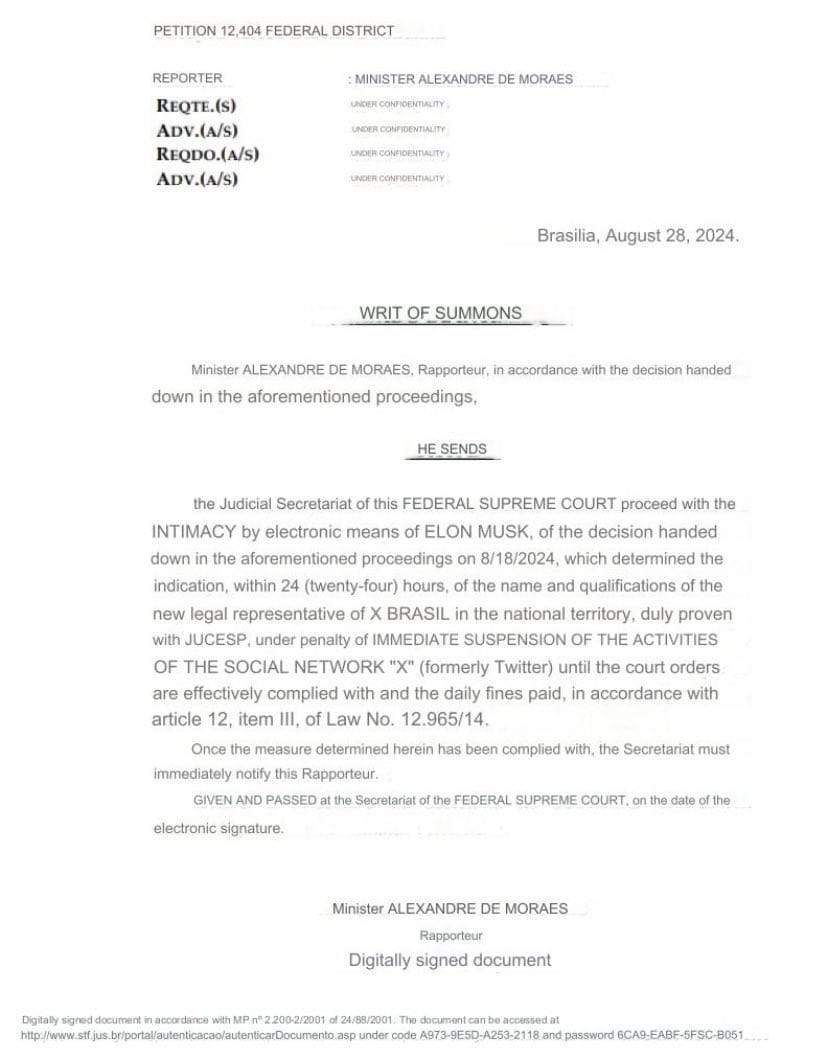
Grok “Generate an image as if Voldemort and a Sith Lord had a baby and he became a judge in Brazil”
— Elon Musk (@elonmusk) August 29, 2024
It’s uncanny! 🤣🤣 pic.twitter.com/aTdVRg9jrw
Legal and Free Speech Issues
- Legal Representation Requirement: The Brazilian Supreme Court's demand for X to appoint a legal representative is a standard legal requirement for foreign entities. The absence of compliance led to the threat of a nationwide ban on X[2][4].
- Censorship Accusations: Musk, a self-described "free speech absolutist," argues that the court's demands amount to censorship and violate free speech principles. He contends that the orders to shut down certain accounts are illegal and contrary to democratic values[1][5].
- VPN Usage and Fines: In response to the ban, the court announced fines of up to $8,874 per day for individuals using VPNs to access X. This measure aims to enforce the ban and prevent circumvention[1].
De Moraes absolutely interfered with the Brazil elections https://t.co/QYCQf02Vzq
— Elon Musk (@elonmusk) April 18, 2024
Broader Implications
- Impact on Users: Approximately 40 million Brazilians use X monthly, making it a significant platform for communication and information. The ban and associated fines could significantly impact users who rely on the platform for news and social interaction[1][5].
- International Precedents: The situation in Brazil is not unique. X has faced similar challenges in other countries, often involving government demands for content moderation or account suspensions. These conflicts highlight the tension between national laws and global platforms' operations[5][8].
- Political Context: The conflict is deeply intertwined with Brazil's political landscape, particularly concerning the influence of social media on public opinion and political movements. Justice Moraes's actions are supported by some as necessary for protecting democracy, while others view them as overreach[3][7].
Given the terrible flooding in Rio Grande do Sul, @Starlink will donate 1000 terminals to emergency responders and make usage for all terminals in the region free until the region has recovered.
— Elon Musk (@elonmusk) May 9, 2024
I hope the best for the people of Brazil. pic.twitter.com/NK6kjz7Iag
Elon Musk decided to shut down X's (formerly Twitter) office in Brazil due to a legal conflict with Brazilian Supreme Court Justice Alexandre de Moraes. The dispute arose from demands made by Moraes for X to comply with orders to block certain accounts accused of spreading misinformation and hate speech. Musk viewed these demands as censorship and refused to comply, leading to a standoff with the Brazilian judiciary.
Reasons for Closure
- Threats to Legal Representatives: Musk claimed that Justice Moraes had threatened to arrest X's legal representative in Brazil if the company did not comply with his orders. This prompted Musk to prioritize the safety of his staff by closing the office[1][2][5].
- Censorship Concerns: Musk, who identifies as a "free speech absolutist," argued that the demands to block accounts amounted to censorship. He stated that principles matter more than profit, indicating his unwillingness to compromise on what he perceives as free speech issues[2][5].
- Legal and Financial Pressures: The Brazilian court had imposed fines on X for non-compliance with its orders, and these financial pressures were compounded by the freezing of Starlink's financial assets in Brazil. The court's actions were part of an effort to enforce compliance with its directives[3][8].
Impact on Starlink
Starlink, another company owned by Musk, was also affected by the legal actions in Brazil. The Brazilian Supreme Court froze Starlink's financial operations as part of the enforcement measures against X. This decision was criticized by Starlink, which argued that it should not be held accountable for the fines imposed on X, as it operates independently[3][8].
Broader Implications
- User Access: Despite the office closure, X remains accessible to Brazilian users. However, the potential for a complete ban looms if the legal conflict continues unresolved. Users may resort to VPNs to bypass any future restrictions, though this could lead to fines[4][7].
- Political and Economic Ramifications: The situation highlights the challenges faced by international tech companies in navigating local laws and regulations. It also underscores the tension between national legal frameworks and global operations, particularly in politically sensitive contexts[2][3].
In summary, Musk's decision to shut down X's office in Brazil was driven by legal threats, censorship concerns, and financial pressures. The conflict with Justice Moraes exemplifies the broader challenges of balancing free speech with legal compliance in international markets.
Conclusion
The legal battle between Elon Musk's X and Brazil's Supreme Court reflects broader global challenges in regulating social media platforms while balancing free speech and legal compliance. The fines for VPN use further complicate the issue, emphasizing the government's commitment to enforcing its orders. This case underscores the complexities of managing digital platforms in a world where legal jurisdictions and free speech principles often collide.
Workarounds?
In response to the ban on X (formerly Twitter) in Brazil, many Brazilians are considering using Virtual Private Networks (VPNs) to bypass the restrictions and continue accessing the platform. Here are some of the alternatives and considerations for Brazilians looking to access X:
VPN Usage
- Turbo VPN: Turbo VPN offers a free version that allows users to access X without additional costs. Users can connect to servers in countries where X is not banned, such as the US, UK, or Canada, to circumvent the restrictions[1].
- PureVPN: This service provides a straightforward method to access X by connecting to a server in a country where the platform is available. PureVPN emphasizes its ability to unblock X while also offering additional privacy and security features[2].
- Surfshark: Known for being budget-friendly, Surfshark allows users to connect to obfuscated servers, which can help bypass government-imposed geo-restrictions. It also offers features like a kill switch and ad blocker for enhanced security[3].
Legal and Practical Considerations
- Fines for VPN Use: The Brazilian Supreme Court has announced fines of up to $8,874 per day for individuals using VPNs to access X. This is part of the government's effort to enforce the ban and prevent circumvention through technology[7].
- Legal Ambiguity: While there is no explicit law in Brazil prohibiting the use of VPNs to access blocked sites, the government's warning about potential fines creates a legal gray area. Users must weigh the risks of using VPNs against the potential penalties[2].
Broader Context
- Previous Precedents: Brazil has a history of temporarily blocking popular platforms like WhatsApp and Telegram due to non-compliance with local regulations. These actions are often reviewed by the full Supreme Court, indicating that the current situation with X could evolve similarly[6].
- Market Impact: With around 40 million Brazilians using X monthly, the ban significantly impacts users who rely on the platform for communication and information. The use of VPNs offers a temporary solution for those unwilling to lose access to X[7].
In summary, while VPNs provide a potential workaround for accessing X in Brazil, users must consider the legal risks and potential fines associated with their use. The situation remains fluid, with ongoing legal and political developments likely to influence the future accessibility of X in Brazil.
Citations:
[1] https://turbovpn.com/blog/how-to-unblock-xtwitter-in-brazil
[2] https://www.purevpn.com/how-to-access/twitter-vpn/brazil
[3] https://www.cloudwards.net/how-to-unblock-twitter-in-brazil/
[4] https://www.nytimes.com/2024/08/30/world/americas/brazil-elon-musk-x-blocked.html
[5] https://www.techradar.com/pro/vpn/you-may-soon-need-a-vpn-to-use-x-in-brazil
[6] https://apnews.com/article/brazil-x-elon-musk-shutdown-moraes-supreme-court-twitter-70fdaeef282e1ac7d649b99cf8241b42
[7] https://www.timesnownews.com/world/planning-to-use-vpn-to-access-x-twitter-in-brazil-supreme-court-says-fines-are-coming-article-112934612
[8] https://brazilian.report/power/2024/08/30/supreme-court-x-ban-brazil/
Citations:
[1] https://www.timesnownews.com/world/planning-to-use-vpn-to-access-x-twitter-in-brazil-supreme-court-says-fines-are-coming-article-112934612
[2] https://brazilian.report/power/2024/08/30/supreme-court-x-ban-brazil/
[3] https://www.csis.org/analysis/brazils-misaligned-censorship-policy-risks-cutting-free-speech-spite-disinformation
[4] https://www.intellinews.com/musk-s-x-faces-brazil-ban-as-court-deadline-passes-in-free-speech-row-341170/
[5] https://apnews.com/article/brazil-x-elon-musk-shutdown-moraes-supreme-court-twitter-70fdaeef282e1ac7d649b99cf8241b42
[6] https://www.theguardian.com/technology/article/2024/aug/30/elon-musk-x-could-face-ban-in-brazil-after-failure-to-appoint-legal-representative
[7] https://www.cnn.com/2024/04/08/tech/elon-musk-brazil-investigation/index.html
[8] https://www.theverge.com/2024/8/30/24231286/x-brazil-ban-elon-musk-legal-representative





